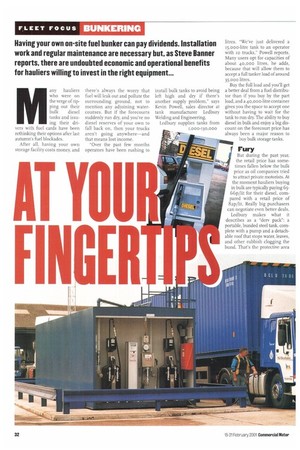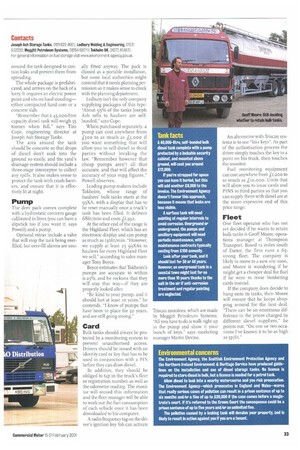1111 any hauliers who were on the verge of ripping
Page 34

Page 35

If you've noticed an error in this article please click here to report it so we can fix it.
out their bulk diesel tanks and issu ing their drivers with fuel cards have been rethinking their options after last autumns fuel blockades.
After all, having your own storage facility costs money, and
there's always the worry that fuel will leak out and pollute the surrounding ground, not to mention any adjoining watercourses. But if the forecourts suddenly run dry, and you've no diesel reserves of your own to fall back on, then your trucks aren't going anywhere—and that means lost income.
"Over the past few months operators have been rushing to install bulk tanks to avoid being left high and dry if there's another supply problem," says Kevin Powell, sales director at tank manufacturer Ledbury Welding and Engineering.
Ledbury supplies tanks from litres. "We've just delivered a 15,000-litre tank to an operator with ro trucks," Powell reports. Many users opt for capacities of about 40,000 litres, he adds, because that will allow them to accept a full tanker load of around 35,000 litres.
Buy the full load and you'll get a better deal from a fuel distributor than if you buy by the part load, and a 40,000-litre container gives you the space to accept one without having to wait for the tank to run dry. The ability to buy diesel in bulk and enjoy a big discount on the forecourt price has always been a major reason to buy bulk storage tanks.
,..1 ri
the retail price has someBut dung the past year,
times fallen below the bulk price as oil companies tried to attract private motorists. At the moment hauliers buying in bulk are typically paying 6566p/lit for their diesel, compared with a retail price of 82p/lit. Really big purchasers can negotiate even better deals.
Ledbury makes what it describes as a "dery pack": a portable, blinded steel tank, complete with a pump and a detachable roof that stops water, leaves, and other rubbish clogging the hand. That's the protective area
around the tank designed to contain leaks and prevent them from spreading.
The whole package is prefabricated, and arrives on the back of a lorry. It requires an electric power point and sits on hard standing— either compacted hard core or a concrete slab.
"Remember that a 45,000-litre capacity diesel tank will weigh 55 tonnes when full," says Tim Cope, engineering director at Joseph Ash Storage Tanks.
The area around the tank should be concrete so that drops of diesel don't soak into the ground so easily, and the yard's drainage system should include a three-stage interceptor to collect any spills. It also makes sense to protect the tank with crash barriers, and ensure that it is effectively lit at night.
Pump
The dery pack comes complete with a hydrostatic contents gauge calibrated in litres you can have a dipstick too if you want it, says Powell) and a pump.
Optional extras include a valve that will stop the tank being overfilled, but over-fill alarms are mu
ally fitted anyway. The pack is classed as a portable installation, but some local authorities might contend that it needs planning permission so it makes sense to check with the planning department.
Ledbury isn't the only company supplying packages of this type: "About 95% of the tanks Joseph Ash sells to hauliers are selfbunded," says Cope.
When purchased separately, a pump can cost anywhere from £300 to as much as £3,000 if you want something that will allow you to sell diesel to third parties without breaking the law. "Remember however that cheap pumps aren't all that accurate, and that will affect the accuracy of your mpg figures," Powell observes.
Leading pump makers include Tokheim, whose range of hauliers' bulk tanks starts at the 93XA, with a display that has to be reset manually once a truck's tank has been filled. It delivers 681itimin and costs /1,592.
At the other end of the range is the Highland Fleet, which has an electronic display and can pump as much as 901A/rain. "However, we supply at least 25 93XAs to hauliers for every Highland Fleet we sell," according to sales manager Tony Boyce.
Boyce estimates that Toldieim's pumps are accurate to within 0.25%, and he reckons that they will stay that way—if they are properly looked after.
"Be kind to your pump, and it should last at least io years," he contends. "I know of pumps that have been in place for 30 years, and are still going strong."
Card
Bulk tanks should always be protected by a monitoring system to prevent unauthorised access. Drivers should be issued with an identity card or key that has to be used in conjunction with a PIN before they can draw diesel.
In addition, they should be obliged to tap in the truck's fleet or registration number, as well as the odometer reading. The monitor will record this information and the fleet manager will be able to work out the fuel consumption of each vehicle once it has been downloaded to his computer.
A radio frequency tag on the driver's ignition key fob can activate
Triscan monitors, which are made by Meggitt Petroleum Systems. "All you have to do is walk right up to the pump and show it your bunch of keys," says marketing manager Martin Devine. An alternative with Triscan systems is to use "kiss keys". As part of the authorisation process the driver simply touches the key to a point on his truck, then touches the monitor.
Fuel monitoring equipment can cost anywhere from I,2OO to as much as £10,000. Units that will allow you to issue cards and PINS to third parties so that you can supply them with diesel are at the more expensive end of this price range.
Fleet
One fleet operator who has not yet decided if he wants to retain bulk tanks is Geoff Moore, operations manager at Thompson Transport. Based 12 miles south of Exeter, the firm runs a 65strong fleet. The company is likely to move to a new site soon, and Moore is wondering if he might get a cheaper deal for fuel if he were to issue bunkering cards instead.
If the company does decide to hang onto its tanks, then Moore will ensure that he .keeps shopping around for the best deal. "There can be an enormous difference in the prices charged by different diesel suppliers," he points out. "On one or two occasions I've known it to be as high as 5p/lit."




































































































